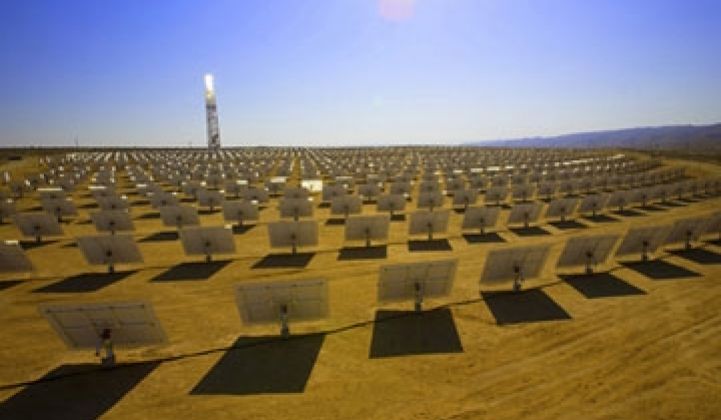BrightSource Energy said Wednesday it has inked contracts with the Pacific Gas and Electric to sell the utility electricity from solar-thermal power farms with a total of 1.31 gigawatts in capacities.
The agreements would replace the one PG&E previously signed with BrightSource last year for up to 900-megawatts of solar-thermal power, both companies said. The new agreements call for building seven solar-thermal plants.
BrightSource's ability to demonstrate the company's technology through its power project in Israel's Negev Desert played a role in convincing PG&E to expand its power purchases, said BrightSource CEO John Woolard in an interview after the announcement Wednesday. BrightSource's technical team includes those who built a series of solar-thermal power plants totally 354 megawatts in California in the 1980s.
"Proving that the technology works -- that it's not an academic exercise but a real power plant producing the highest temperature and highest pressure steam in the world -- and moving forward with permitting give [PG&E] the comfort that we are a company that can execute," Woolard said.
The Oakland, Calif.-based startup also has a deal to build 1.3 gigawatts worth of power plants and deliver the electricity to Southern California Edison.
BrightSource would own and operate the power plants. The solar-thermal power developer has declined to disclose the costs of building these power plants. The company is in talks to line up loans, tax equity and equity financing for the projects. BrightSource has applied for a loan guarantee from the U.S. Department of Energy, but hasn't said publicly the amount it's seeking.
BrightSource is developing solar-thermal power plants with what's called a "power tower" design that uses a field of mirrors, or heliostats, to concentrate the sunlight and heat the water atop of a central tower for steam generation. The steam is then piped to turn a turbine for electricity production.
This approach is more novel than the design that uses parabolic troughs to focus and direct the sunlight to fluid-containing tubes that carry the heated fluid to a heat exchanger to generate steam for electricity production. Companies that are developing parabolic trough technologies include Solar Millennium in Germany and Abengoa Solar in Spain. Both Solar Millennium and Abengoa, both of which have competed projects, also are competing against BrightSource for utility contracts southwestern states such as Arizona and Nevada.
The startup is developing the power projects in the Mojave Desert in California, in the town of Ivanpah, and recently secured more land in Nevada through an agreement with real estate development firm Coyote Springs Land (see BrightSource Locks Up Nevada Land for Solar Thermal).
To fulfill its contracts with PG&E, BrightSource said it would build the first of the power projects in Ivanpah. The 110-megawatt project would begin operation in 2012. The company plans to start construction later this year or in 2010, depending on when it secures the necessary state permits. Overall, BrightSource plans to construct power projects through 2017 for delivering power to PG&E and Edison.
Wading through the permitting process won't be so easy, particularly when addressing environmental concerns. Although renewable power projects promise to deliver cleaner energy, that alone is no guarantee that they would be warmly received by residents near the project sites or environmental and business groups. The 420-megawatt Cape Wind project off the shore of Massachusetts is a good example -- Sen. Ted Kennedy opposes it.
California's investor-owned utilities such as PG&E and Edison are under a state mandate to include 20 percent of its power mix with renewable electricity. Edison was able to add renewable power to nearly 16 percent of its power mix by the end of 2007. PG&E followed with 11.4 percent and San Diego Gas & Electric with 5.2 percent.
BrightSource has raised over $160 million from investors including Google.org, VantagePoint Venture Partners, BP Alternative Energy, Draper Fisher Jurvetson, Chevron Technology Ventures and Black River.
Join industry leaders and influencers at Greentech Media's Concentrating Solar Technologies & Markets at Intersolar in Munich, Germany on May 29.




